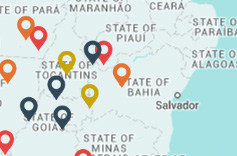Fundamental Rights Clinic of the State University of Rio de Janeiro Law School
Development of the “UERJ Rights Clinic” as a center of national reference in strategic litigation on matters of fundamental rights
Rio de Janeiro
Objetivos e público prioritário
Consolidating the UERJ Clinic as an academic center for the practice of defense and promotion of human rights in the country, along with improvement to democracy, through initiatives focusing on applied research and legal representation of civil society organizations in strategic litigation suits related to the protection of fundamental rights.
Main activities
– Research projects on legal doctrine, jurisprudence and other areas of study necessary for action on selected cases;
– Production of petitions, memoranda and opinions to be presented in legal cases in which the Clinic is involved, and, eventually, oral arguments to be made at these cases’ trials;
– Offering of legal guidance and assistance to entities represented by the Clinic;
– Debates, seminars and workshops, to be given by professors, researcher and social workers involved in human rights work;
– Publication of academic articles and research on topics related to fundamental rights and the cases in which the Clinic is involved.
About the organization
The Fundamental Rights Clinic of the State University of Rio de Janeiro Law School is a university-based center for the promotion and defense of fundamental rights in the country. The Clinic’s actions are focused on offering specialized legal assistance and representation for civil society entities in strategic litigation in the public interest, legal cases with an elevated potential for promoting social transformations and the growth of the protection of human rights.
Results
The UERJ Rights Clinic developed strategic litigation actions with emphasis on four projects. One of them is the State of Unconstitutional Affairs in the Brazilian Penitentiary System, a lawsuit seeking preemptive measures that redress the flawed fundamental precepts held by the public authorities regarding the penitentiary system in Brazil. The action afforded a lot of visibility for the clinic, especially in trade media and media in general. In the Federal Supreme Court trial the lawyer Daniel Sarmento addressed the justices with an oral argument in support of the thesis State of Unconstitutional Affairs. This was the first time that the concept State of Unconstitutional Affairs, originating from Colombia, was recognized by the Federal Supreme Court. This means that in the future, beyond the penitentiary question, it can be used in other cases of serious human rights violations to justify intervention by the Judiciary Branch. The other project developed concerned an extraordinary appeal (a measure of the Supreme Court to counter court decisions deemed unconstitutional) for achieving social recognition of transsexual people’s gender identity. The clinic acts as amicus curiae in a lawsuit filed with the Federal Supreme Court that seeks to end the invisibility, marginalization and violation of these people’s fundamental rights. The Clinic argued — in partnership with the Latin American Center on Sexuality and Human Rights and the Laboratory Integrated with Sexual Diversity and of Gender, Policy and Rights — that the constitution requires that people are treated according to the gender by which they identify, profess and express themselves, and that the discriminatory treatment that views these gender expressions as an excessive burden are unconstitutional. During the trial, the lawyer Juliana Cesario Alvim made an oral argument defending the right of transsexual people to decide which gender to identify as. The oral argument just as much as the memorandum were commended and mentioned by the justice in charge, and by other justices, during the trial. After the the votes cast in favor by justices Luis Roberto Barroso (in charge) and Edson Fachin, the trial was interrupted by justice Luiz Fux’s request to examine the case records. This cause is also spread by the Clinic through participation in debates. The third project concerns the representation of the group Torture Never Again in two legal cases, filed by the Attorney General of the Republic, in which are questioned the constitutionality of the military courts’ jurisdiction to judge crimes committed by military personnel, performing duties on behalf of the Armed Forces, as well as the constitutionality of the Article that gives jurisdiction to the military courts, in times of peace, to judge civilians, with a demand that this privilege be restricted to civilian courts. The fourth project deals with quilombo communities’ right to land. The clinic partnered with the Quilombo Communities of Rio de Janeiro Association, representative of the quilombo communities in the state, in order to guarantee the protection of these communities’ right to land.
Funding Line
Strategic Litigation (2014)
Year
-
Total Granted
R$ 102,999.60
Duration
12 months
Main Themes
Guaranteeing the rule of law and criminal justice






